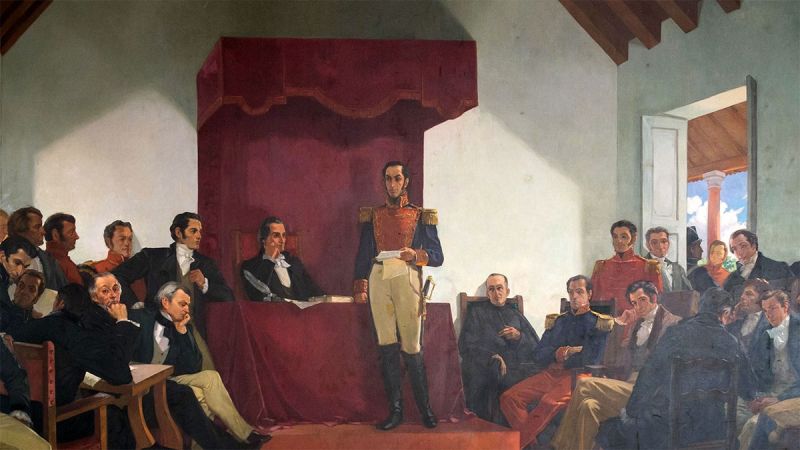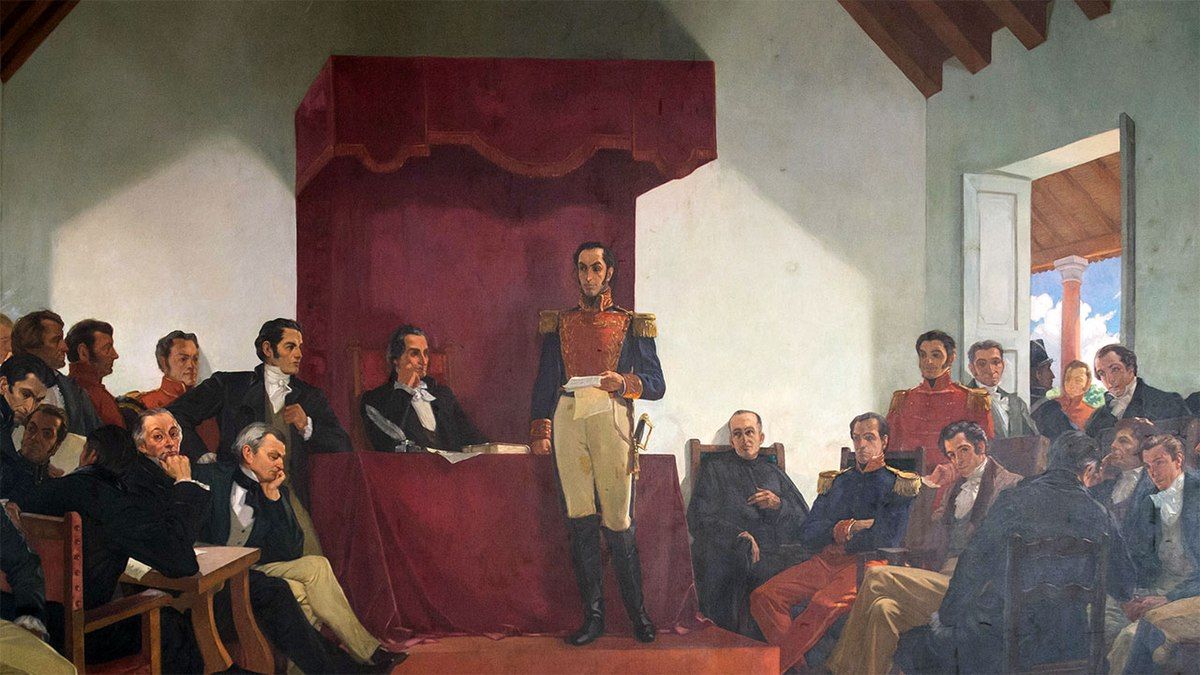Popular Sovereignty and Moral Power in the Angostura Speech


Internet

Published at: 16/02/2024 10:16 AM
The Angostura Speech delivered by El Libertador Simón Bolívar on February 15, 1819, before the Constituent Congress meeting in Angostura, today Ciudad Bolívar, presents the draft Republic for the period that began with the liberation of Guiana in 1817. In it, he proposed the reform of the Federal Constitution of 1811, to overcome the Dictatorship that the war had entrusted to him and create a new institutionality with the assimilation of the experience of the war, formalizing a democratic government legitimate by popular elections, in accordance with the republican system.
At that time, they barely existed in America and the world: the Republic of the United States (1787) and that of Haiti (1804). The Republic of the French Revolution (1789-1799) had been overthrown by Napoleon Bonaparte. The Monarchy of that time was an absolutist system of government, where sovereignty resided in the will of the King, who was considered a representative of God, therefore, his subjects were subject to his will, denying peoples participation in political and social decisions.
In the republican system, sovereignty resides in the people and is therefore opposed to absolutist monarchies. The Republics of Spanish America assumed the foundations of the Declaration of Human and Citizen Rights, whose basic principles were: the right to freedom, property, equality, security, resistance to oppression, freedom of opinion and the press, national sovereignty and the law as an expression of the general will.
Popular Sovereignty and Citizenship.
In the Congress of Angostura, the first thing Father Libertador did was to divest himself of the Supreme Command and return it to the deputies as representatives of the people, giving evidence of his commitment to National Sovereignty, while exalting the status of Citizen, which was a new concept proper to the Republic.
Blessed is the Citizen who, under the coat of arms of his command, has summoned National Sovereignty to exercise his absolute will! () Right now the supreme head of the Republic is nothing more than a simple citizen; and he wants to remain so until his death. I will, however, serve in the arms race as long as there are enemies in Venezuela.
Popular Sovereignty in the Constitution of 1811 was defined as follows:
The sovereignty of a country or supreme power to regulate and equally direct the interests of the community resides, therefore, essentially and originally in the general mass of its inhabitants and is exercised by means of their Proxies or Representatives, appointed and established in accordance with the Constitution. (Article 144)
But to exercise sovereignty, it was necessary to elect representatives to the public authorities, but not all people could vote; they had to be an owner or a professional or a military owner or have a job with an income of three hundred pesos per year. The protagonists belonged to the owners, resulting in that Republic, a Democracy of elites.
The Liberator intended to democratize the republic, the lessons of the war, especially those of the year 1814, “the terrible year”, indicated to him the need to include the mass of the poor in the new society and the new system of government that he wanted to create.
However, El Libertador poses to the deputies of the Congress the problem of the exercise of Popular Sovereignty, by a people that was not prepared to make collective decisions for the progress of the country. The theorists of the republic determined that the exercise of sovereignty implied the existence of a virtuous people and citizen, understanding by virtuous values of coexistence and citizenship to decide together for the common good, patriotic conscience, respect for laws and magistrates ( authorities of the republic). To better explain himself, the Liberator defined the Venezuelan people when he urged the deputies to consider that:
Let us bear in mind that our people are not the European people, nor the North American people, who are rather a composite of Africa and America, than an emanation of Europe; because, even Spain itself, ceases to be European because of its African blood, its institutions, and its character.
This definition was a very significant contribution in that caste society, where the ideas of people and equality did not include all sectors. The Liberator points out the lack of preparation of the people, of that composite of Africa and America, to administer democracy and freedom when he says: “Anointed to the American people to the triple yoke of ignorance, tyranny, and vice, we have been unable to acquire, neither knowledge, nor power, nor virtue.” “will they be able to march with firm steps towards the Augustus Temple of Freedom?
Own laws for an original people
The Liberator invokes the need to make laws of their own for that people, laws for a popular democracy:
Doesn't the spirit of the laws say that they must be appropriate for the people they are making? that laws should be related to the physical nature of the country, to the climate, to the quality of the terrain, to its location, to its extension, to the lifestyle of the peoples? (...) Here is the code we should consult, and not Washington's ()
And he challenged the deputies by telling them: It's up to you to solve the problem. How, after having broken all the obstacles of our former oppression, can we do the wonderful work of preventing the remnants of our hard irons from being changed into liberticidal weapons?”
For the Liberator, the solution to the problem involved originality, and he proposes a model of Republic that some people call the Radical Democratic Republic, since, among other measures, it involved giving freedom to slaves, exercising equality and popular education that would receive special attention through a new public power, born of his intellectual creation: Moral Power.
Equality, the Abolition of Slavery and Moral Power.
For Bolívar, freedom and equality were the pillars of justice and she, the queen of republican virtues. Therefore, it assumes the defense of equality: “the fundamental principle of our system depends immediately and exclusively on the equality established and practiced in Venezuela”; the abolition of slavery: I abandon to your sovereign decision the reform or revocation of all my statutes and decrees; but I implore the confirmation of the absolute freedom of slaves, as my life, and the life of the Republic would implore.
In the Liberator's thought, virtue is a fundamental value to guarantee the conscious and responsible participation of all sectors of the population and to realize the transformation of the people and their citizens, into a free, strong and virtuous people of virtuous, patriotic and enlightened men, Moral Power was proposed:
Meditating on the effective way to regenerate the character and customs that tyranny and war have given us, I have felt the audacity to invent a Power Morale.
He was inspired by ancient Greek and Roman institutions such as the Areopagus and invited the Congress to deal with popular education: Popular education must be the first-born care of
the Congress's fatherly love. Morals and lights are the poles of a Republic; morality and lights are our first needs. (...) let us renew in the world the idea of a people who are not content with being free and strong, but who want to be virtuous.
Let us constitute this Areopagus to ensure the education of children, over national instruction to purify what has been corrupted in the republic; to accuse ingratitude, selfishness, coldness of love for the country, leisure, negligence of citizens
. Moral Power would reside in the Areopagus, which would exercise full and independent authority over public customs and over early education and instruction, guaranteeing moral and patriotic education, while monitoring, judging and condemning to the vicious citizen with moral penalties, of opinion, to correct customs and would reward the virtuous. The Moral Power was not approved, but they left it as an annex for evaluation by future generations.
The validity of the Angostura Speech.
After the death of the Liberator, except for brief stellar moments, sovereignty has been in the hands of the bourgeoisie, but with the rise to power of Commander Chávez in 1999, a new era of Popular Sovereignty began: the Bolivarian and socialist revolution of the 21st century, with governments whose political will is to govern with and for the people.
To build a State, adequate to Popular Sovereignty, the Commander drew between the strategies: promoting a Communal State (explosion of Communal Power) and activating what he called, the “Moral Engine and Lights”, an educational project that should transcend classrooms, go to communities and workplaces, “The whole country a school to build unity of the people around ethical and moral values: knowledge, work, solidarity, patriotism and probity.
The Communes must be the space on which we are going to give birth to Socialism... a commune without a factory, without land for planting, without socialist trade is not a commune. Hello Theoretical President No. 1
It is now when we are beginning the long period; that is, the Long Breath project that seeks to realize the original project of Bolivar: a great, prosperous homeland where morals shine, where lights shine (Chávez 25/02/2007).
The Chavista people and the Bolivarian government have been creative to promote Popular Sovereignty based on the Bolivarian Constitution of 1999, which establishes a participatory and leading democracy, there is much positive to tell in this regard, but the enemies of the project have also been creative to generate a war that has limited progress and in some aspects has forced us to retreat, especially after the physical disappearance of the Commander. But even in the midst of the war being waged against us by the empire and its lackeys, it is necessary to redouble efforts to achieve the Communal State and resume the Moral Engine and Lights, with which we will also be fulfilling the Liberator's political project expressed in the Angostura Speech.
María Magdalena Zambrano Bolivar Insurgente Cultural
Moviment/ History, Memory and Heritage Network, state. Bolívar